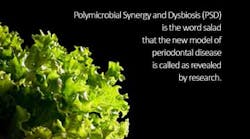The new model of periodontal disease
Polymicrobial is self-explanatory; i.e., a community of different microbes. Synergy is a term used in many different settings. In business, it can be defined as the increased effectiveness that results when two or more people or businesses work together. The definition in the context of PSD is actually very similar. Synergy in this case refers to the coordinated action of oral bacteria promoting inflammation and bacterial survival. The term further explains that the coordinated action of the community of microbes is exponentially greater than it would be if the individual microbial species were working separately, and not in a good way. It’s all about the increased virulence of the synergistic oral bacteria, and how damage is ramped up when they work together.
Dysbiosis is an imbalance in the abundance or influence of a microbial community. A dysbiotic state promotes inflammation and periodontal disease. A homeostatic (nondysbiotic) balance of bacteria promotes healthy gums.
In this current model of periodontal disease, bacteria such as Porphyromonas gingivalis are called periopathogens. In the new model of periodontal disease development and progression, P. gingivalis is called a keystone pathogen. This is not just a matter of verbiage, as you will see.
It should be borne in mind that the current model of periodontal disease also involves a polymicrobial dysbiotic bacterial community. The current model indicates that a predominance of perio pathogens is required for disease development, which is a dysbiotic state. There are, however, fundamental and critically important differences in the current and new, emerging understanding of periodontal disease. The differences are critically important in a variety of ways. The next blog post will further explain what’s going on with these clever, microbial rascals.
READ MORE OF DR. NAGELBERG’S BLOGS . . .
About the Author
Richard H. Nagelberg, DDS
Richard H. Nagelberg, DDS, has practiced general dentistry in suburban Philadelphia for more than 30 years. He has served on many advisory boards and as a consultant and key opinion leader for a variety of companies and organizations. Dr. Nagelberg is the Director of Medical Affairs at OraPharma, a division of Bausch Health US, LLC. His practice and other professional activities are centered on the impact dental professionals have beyond the oral cavity. Contact Dr. Nagelberg at [email protected].
Updated May 2022


